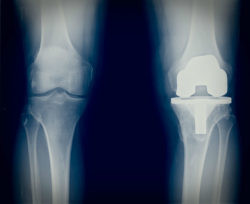Top Class Actions’s website and social media posts use affiliate links. If you make a purchase using such links, we may receive a commission, but it will not result in any additional charges to you. Please review our Affiliate Link Disclosure for more information.

In some knee replacement surgeries, bone cement is used to attach the implant to the patient’s bone. There are three types of bone cement that can be used in total knee replacement surgeries: high, medium, and low viscosity cement. High viscosity cement is preferred by surgeons because it takes less time to mix and also takes less time to bond to the bone when it is used in a knee replacement.
However, some researchers say high viscosity cement doesn’t bond as well with the bone as other cements do, so this cement can cause patients more problems later on. Some patients report that the bone cement does not keep the implant in place the way it should. This can cause the implant to loosen from the tibia. When this occurs in a case in which the site does not become infected, this condition is known as aseptic tibial loosening.
Patients with high viscosity bone cement used in their knee replacement surgeries sometimes experience aseptic tibial loosening. Aseptic loosening occurs more frequently in the part of the implant that attaches to the tibia, rather than the one attached to the femur. In 2002, the FDA outlined the health risk associated with bone cement, noting that loosening was a possibility.
Some patients experience injury beyond the injury done by the tibial loosening. In some cases, patients have to have a revision surgery to correct the problems caused by bone cement failure. Revision surgeries have a higher risk of infection and complication than initial surgeries, and often have a longer recovery time.
The Intelligencer notes that bone cement can be difficult to remove during a revision surgery, possibly causing further problems.
Patients who experience bone cement failure may experience a range of adverse symptoms, including:
- Persistent pain
- New chronic pain
- Instability
- Loosening of the knee implant (aseptic loosening)
- Swelling
- Decreased range of motion
Bone Cement Lawsuits
Knee replacement patients have already filed lawsuits over bone cement failure.
In 2018, a patient filed a lawsuit against DePuy, a Johnson & Johnson subsidiary. The patient alleged that the company’s SmartSet HV Bone Cement was used in their surgery, and claimed that it caused injury. According to the patient, a defect in the cement caused the implant and the cement to loosen over time. The patient also claimed that this occurrence required them to have a revision surgery.
Allegedly, the SmartSet HV Bone Cement didn’t go through enough testing before it was released onto the market. The patient claimed that the product was approved through a “fast track” approval process that allowed a dangerous product go onto the market.
If you experienced aseptic tibial loosening after your knee replacement surgery and you believe that bone cement was used in your surgery, you may be able to file a legal claim and receive compensation for your physical, financial, and emotional injuries.
So, patients who had to undergo revision surgery for bene cement failure may be able to receive compensation for the injury caused by the revision surgery as well as the failure of the bone cement.
If you or a loved one underwent revision knee replacement surgery or your doctor is recommending revision surgery three years or less after the initial implant and a bone cement was used, you may qualify to file a knee replacement revision surgery lawsuit. See if you qualify by filling out the free form on this page.
ATTORNEY ADVERTISING
Top Class Actions is a Proud Member of the American Bar Association
LEGAL INFORMATION IS NOT LEGAL ADVICE
Top Class Actions Legal Statement
©2008 – 2024 Top Class Actions® LLC
Various Trademarks held by their respective owners
This website is not intended for viewing or usage by European Union citizens.
Get Help – It’s Free
Join a Free Knee Replacement Cement Failure Lawsuit Investigation
If you qualify, an attorney will contact you to discuss the details of your potential case at no charge to you.
PLEASE NOTE: If you want to participate in this investigation, it is imperative that you reply to the law firm if they call or email you. Failing to do so may result in you not getting signed up as a client or getting you dropped as a client.
Oops! We could not locate your form.












